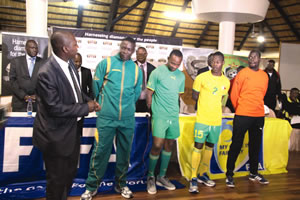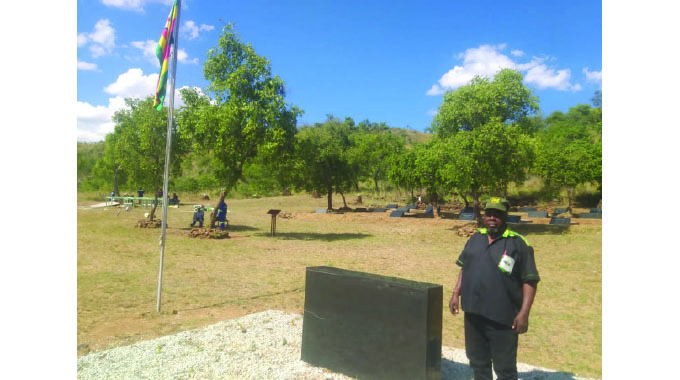I am walking on borrowed legs
corner, like ghostly figures.
Hwange National Park, Zimbabwe’s perfect theatre of the jungle is teeming with wildlife as usual and is dry. Hwange can be silly dry with temperatures soaring up to 40 degrees Celsius. It can be hot even early in the morning.
Under the blistering heat, a British born animal conservationist employed by Painted Dog Conservation, Greg Rasmussen takes to the air in a single engine plane, to track a rhino, one of the world’s highly endangered mammals.
His pilot has pulled out last minute but the job has to be done so he has to fly himself above the wilderness. As soon he gets airborne over unknown territory, the decibels set wildlife scampering.
Buffalo huddle and moo in formidable herds, flap their ears, nose up and challengingly spatter the ground with dung before boastfully stampeding.
Protective elephants guard their young under the shed of a fat baobab trees.
As fate would have it, suddenly a heavy wind broke one wing of Greg’s plane and he crashes. Injured with legs broken on six places he exposes himself to a buffet of predators, from a lioness to hyenas.
For those in the know crash-landing in the African bush is landing in hell. It is a death warrant, signed by fate.
Alone, badly injured and dehydrated Greg shelters under the fuel-dripping, wreck that was once his plane and the story of his 27 hours exposure to the predators starts. His friends and workmates led by Peter Blinston, search for him without success.
“When my pilot pulled out at the last minute, I blamed Murphy’s Law. If I was to track animals from the air, I was going to have to fly the plane myself.
“It must have been Murphy, too, who ensured that I was dehydrated before the crash,’’ recalls Greg.
Before the crash Greg, had stopped a Sinamatela camp for refueling. There was no water and he thought he would get water to drink after the flight. Unbeknown to him his body would need a lot of that water within a few minutes.
“At my last stop, Sinamatella, a diesel shortage meant the pumps were only operating for a few hours a day, and so there was no water. No matter, I thought, I’d be able to drink all I wanted after I’d finished my tracking flight the next day.
“I was airborne shortly after sunrise, and soon heard the first signal from a rhino radio-collar. I established its position, increased power and started climbing again. Then it happened. A wind hit the plane. My right wing dropped. The tail lifted and I was in a tight spiral heading for the ground. There was no way out. I saw trees and rocks and then – thump and thud.”
For a moment it was like a dream. It was like he would wake up and find out that it was a bad dream. But reality dawned on him when he gained full consciousness.
“Blood trickled from my nose and, far more worrying, my legs were totally lifeless. With some relief, I realised I could at least wiggle my toes. The impact had detuned the radio, and the keypad was frozen. I had no idea if anybody would hear my Mayday call. I heard leaking petrol, and knew I had to get out. Using only my arms, I pulled out of the cockpit and dragged myself away.
“I was lucky to be alive, but I knew that I’d broken both femurs. I had to untie my boots to relieve an explosive pain in my feet – but how? It took me two hours to unpick my laces with a thin stick and push them off at the heel with a bigger one. It was midday and very hot. My lips were cracked and the dryness in my mouth indescribable – I was seriously dehydrated. My only option was to seek shade under the inflammable remains of my plane. As I moved, I felt my muscles contracting around the jagged, broken femurs and a sickening creak in my pelvis. That, too, was broken,” recalls Greg.
Meanwhile the search for Greg continued on foot, on cars and on planes but by sunset, they had not located him. Night fell and fear gripped everyone, as it was a known fact that predators were more active at night than during the day.
“The sun set around six. Elephants lower down the hillside trumpeted and stampeded towards me and i hit the wreckage to scare them off. Later i heard the soft “ooogh, ooogh” call of a lioness and used the same trick. I had never before felt so vulnerable in the bush. I beat hard on the windscreen and all went quiet. It was going to be a long night. I hyena came by too and I had to use a stick to beat the wreck and scare it off. I survived the elephant, the lion and the hyena that way.
“Two hours after daybreak, I heard an aircraft engine, which then faded away again. And, eventually, footsteps behind me… I was rescued.
“Halfway to Victoria Falls Hospital , the helicopter lurched sickeningly to the left and right. “Nearly had a bird strike,” the pilot said. Bird strike, I thought – or Murphy at work again?
He almost lost his feet but doctors saved them through 100 operations. He is 3 inches shorter now, back to his feet and walking. When I went to Europe for further treatment they were surprised that I still had my legs. They said surgeons in Zimbabwe were too good. If it was there they would have amputated my legs. So, Im walking on borrowed legs,’’ says Greg.
Greg as born in London but moved to Zimbabwe with his parents when he was eleven years old where he attended Falcon College . This was followed by a spell in the merchant navy. In 1988 Joshua Ginsberg offered him a job observing animals in Hwange National Park . He established the Painted Dog Conservation project in 2002 before he crashed and to day he is back at work and walking on his borrowed legs. Some men are born lucky.
[email protected]






Comments